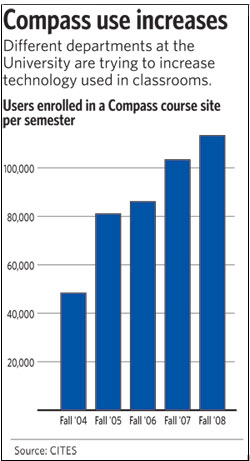UI initiating use of technology across campus

Feb 26, 2009
Technology is everywhere, from iPods to YouTube – and nearly every student is exposed to it on a daily basis.
But students’ and teachers’ knowledge of technology, and of its vital importance to education, doesn’t usually extend much further than PowerPoint presentations and search engines – which is a problem professors and faculty are currently seeking to address on this campus.
Rajshree Agarwal, director of technology management and strategy in the college of Business, is working to infuse the current coursework with new ways to accomplish quality learning.
“Conversations were started almost two years ago on how to make Illinois more intrapreneurial,” Agarwal said, referring to building on past curriculum to bring it up to date.
A staunch advocate for Compass, Agarwal sees the need for more teachers to utilize the many tools on the site, and not limit it to merely assignments and grade reports.
Get The Daily Illini in your inbox!
Technology is used for communication, she said.
Agarwal not only uses the basic functions on Compass, but requires her students to post materials on the board before class to prepare classmates, submit assignments, and participate in pre-class quizzes in order to improve the students’ abilities to be prepared for class and get more out of class discussion.
Agarwal also is utilizing a virtual game in her class to better teach students certain points that are hard to come by in the real world. The students log into the game and are paired with classmates with specific assignments and goals to accomplish, each with different outcomes, and then receive rewards if they are successful. It teaches students the importance of working toward a goal without getting distracted by other people’s performances.
Judy Tolliver, coordinator for Informatics Educational Programs, sees the need for all students to actively study informatics in order to enhance their understanding of and contribution to the world.
“Today’s students do need a basic understanding of how computers do what they do, and more importantly, they need a detailed understanding of how to apply them as tools of empowerment while considering their impact on individuals, groups and society,” she said.
In 2006, the University founded the Illinois Informatics Institute in order to strengthen undergraduate education by integrating informatics into the curriculum.
This project was brought about when the University received a grant from the National Science Foundation. The goal of the grant was to not only revamp the current computer science and informatics education, but also to use what happens at Illinois to promote the venture all over the nation. An informatics minor was started in spring 2007, and currently around 100 students are enrolled in the Institute.
Informatics can complement virtually any course or major, and the first graduate from the program was a student of philosophy. Tolliver said that the study of informatics will play a crucial role in the near future as more information is put on the computer and the Internet, and one’s ability to share and access information will be affected by their ability to use various technologies.
Sharon Tettegah, assistant professor in educational psychology, also sees technology integration as vital to current and future education. Tettegah said education is faced with a major problem: test-taking has taken prominence while creativity has taken the back seat. For Tettegah, the computer is key in encouraging creative thinking, as long as it is used to integrate more learning.
She mentioned such technology like the Nintendo Wii, which not only utilizes virtual game programs, but also incorporates physical movement and interaction with others.
Tettegah herself has developed a simulation program, Clover, that helps students to talk about problems they face in school. The program allows students to create a story through animation, and gives students the freedom to choose their own dialogue, graphics, voices and more.
Not only do classes need to integrate more technology in modern learning and teaching, but they need to take a more business-like approach to teaching as well. “Education is a product,” Tettegah said. Teachers and curricula writers need to include modern tools for modern learners, and there should be competition, risk, action, new tools, and collaboration to improve the student learning environment.
“We can no longer teach the way we used to teach,” Tettegah said. “We don’t need any more recipes for instruction. People are different now, and have new ways of learning.”
CITES during the past year
-CITES services have grown from hosting around 6,000 wiki pages to hosting over 17,000 pages.
-The CITES wiki stores past versions of every page. The service has grown from less than 50,000 page versions to 110,000 total page versions stored.
-Wiki service traffic has grown considerably in the past year, with approximately 3 new requests for a Wiki page per day
Source: cites





